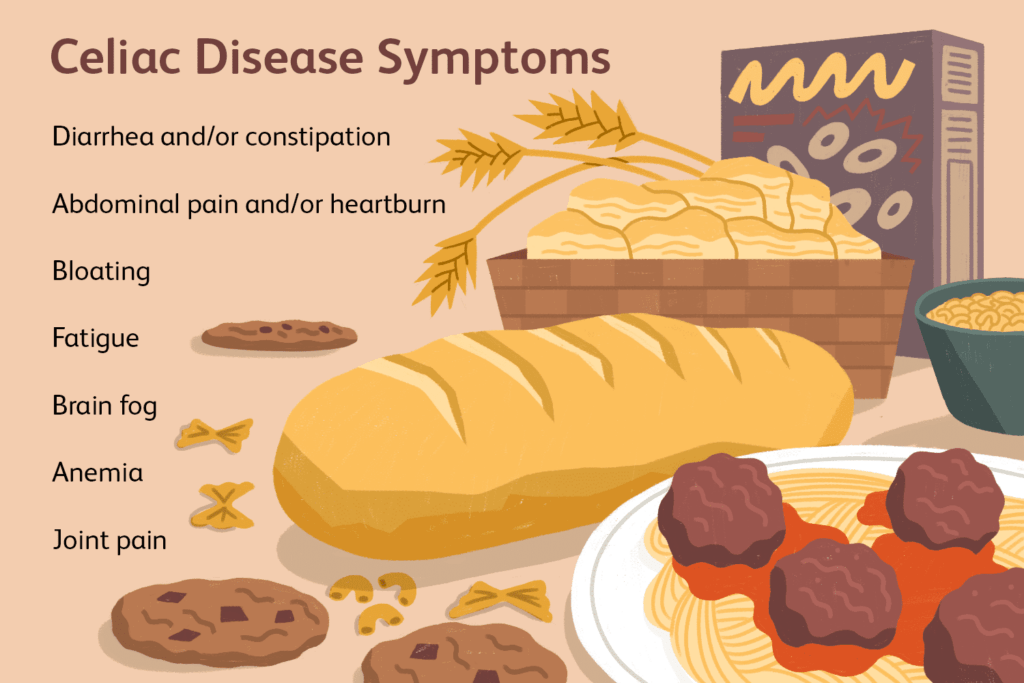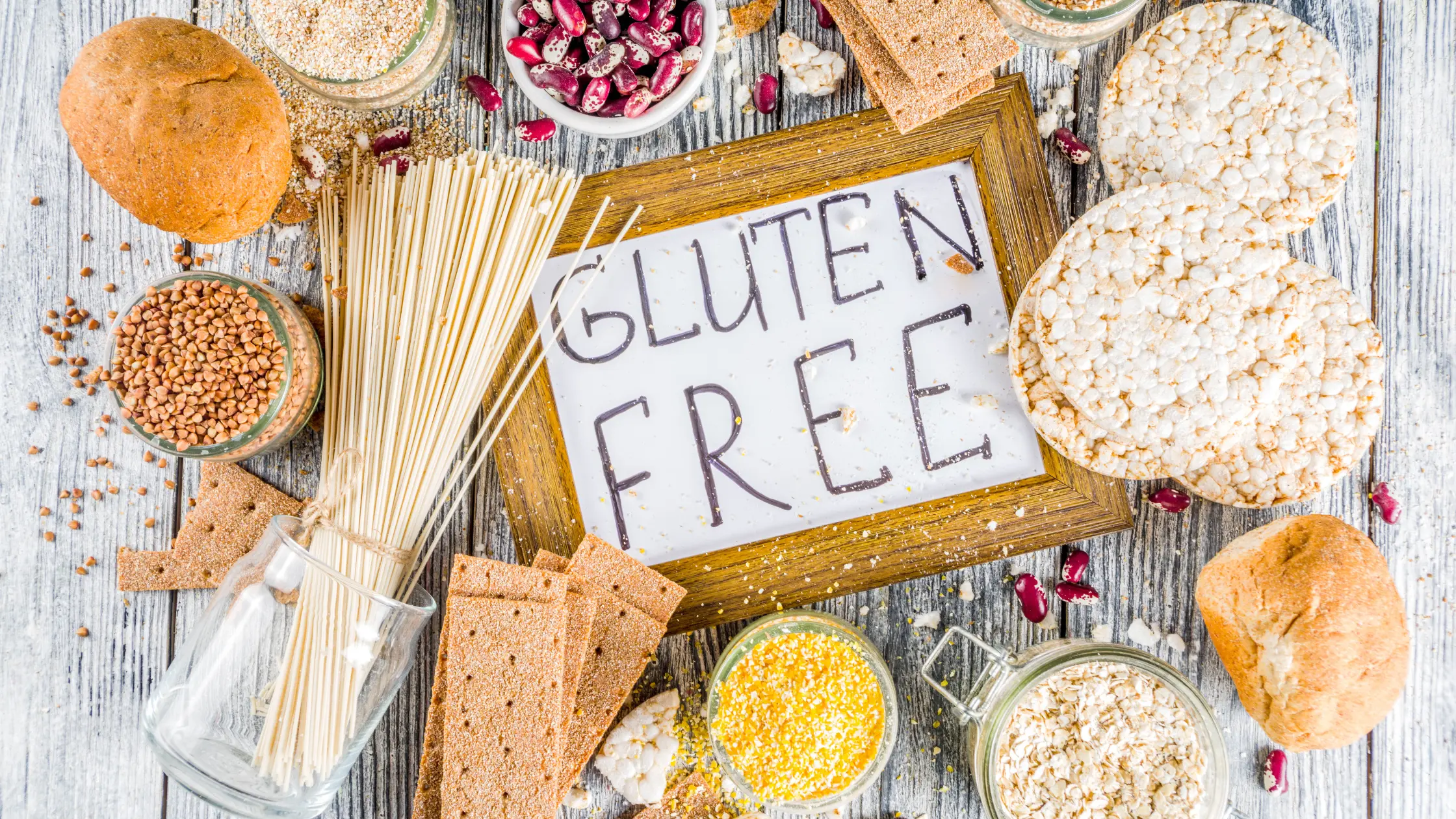In a world where our health is mostly determined by the foods we eat, it is critical to comprehend the complexities of ingredients like gluten. To explore the complexities of gluten, its persistence in the human body, and the effects of a gluten-free lifestyle, let’s take a trip through the digestive system.
Have you ever hoped that the gluten you ate would go away from your body while you waited with a stomach ache? We all do, particularly in cases where someone has celiac disease or extreme gluten intolerance. However, how long does gluten remain in your body? However, many recent studies also suggested that the effects of IgA and IgG antibodies in older persons might extend up to two years. Furthermore, it may take even longer for the stomach lining to fully heal. However, this process can be sped up in some ways. Continue reading!
What Is Gluten?
The protein gluten, which is present in wheat, barley, and rye, has gained attention in talks about nutrition. It gives dough its flexibility and influences the texture of different baked items.
Typical Gluten Sources
For people with gluten-related conditions or sensitivities, it is crucial to carefully read labels because gluten can be found in many common foods, including bread and pasta.
The following are a few common food sources of gluten:
Wheat – Wheat and its derivatives, including cake flour, couscous, durum, semolina, and wheat berries.
Barley: Barley flour, malt, vinegar made from malted barley, etc.
Rye: Rye bread, flour, and grains
Oats – Oats tainted with wheat during processing or cultivation. Oats that are gluten-free by certification bear this indication.
Beer: The majority of beers are brewed from cereals that contain gluten. These days, several beers are gluten-free and brewed using rice, sorghum, or other grains.
Soy Sauce: Typical soy sauces are made using wheat. Look for soy sauce with a gluten-free label.
Flavored alcoholic drinks: Gluten additions are frequently added to flavored rums, vodkas, teas, and other drinks.
Baked goods: wheat and barley flour-based pie crusts, bread, cookies, cakes, muffins, and doughnuts.
Pastas: Unless otherwise noted, wheat pastas such as macaroni, ravioli, and spaghetti are not gluten-free.
Sauces: Gravy and other sauces are frequently thickened using wheat flour.

How Much Time Does Gluten Remain In The Body?
Once the gluten has entered your system, it won’t leave until the entire gastrointestinal transit period is finished. 50% of your stomach will be empty after consuming any gluten-rich item for about 2.5 to 3 hours. The entire contents of the stomach will take 4 to 5 hours to empty.
Peptide fragments persist and build up in the small intestine for a few days to two weeks or more following gluten consumption.
When gluten residues persist, an immunological reaction results in inflammation and damage in people with celiac disease or gluten sensitivity. This results in related symptoms.
The small intestine absorbs 85% of the gluten that is consumed, with the remaining 15% entering the general circulation and taking four to six weeks to eliminate from tissue.
It takes much longer for antibodies that the immune system has generated in reaction to gluten to go down between three and six months after a strict gluten-free diet.
For this reason, complete removal from systemic circulation and tissue takes many months, even though a gluten challenge test for diagnosis only needs six weeks of ingestion. Continuous exposure causes progressive, long-lasting inflammation. Once a person is diagnosed with gluten intolerance, they must follow a lifelong gluten-free diet because rigorous restriction gives the gut lining time to repair and antibodies to stabilize.
How Long After Eating Gluten Do Symptoms Start?
The duration required for your body to overcome gluten sensitivity varies greatly from person to person, but it will rely on many things. After eating gluten-rich meals, your stomach will begin to mix with the fluids in your digestive system within one to two hours, causing short-term pain. The stomach will take about 4 hours to fully empty of gluten, followed by the small intestine in 6 hours and the colon in up to 60 hours.
Therefore, you’ll probably start feeling uncomfortable after consuming anything that contains gluten for around 30 to 1 hour. It might continue for three days at most. On the other hand, if you have celiac disease, your body will have a substantially longer gastrointestinal transit time than a healthy person. Additionally, loss of nutrients in your gut and immobility of the small bowel are the main causes.

How Much Time Does Healing Take?
After eating gluten-rich cuisine, your digestive system and general health should improve in a few days. In that allotted time, your symptoms will also become better. However, it may take up to six months for the damage to your small intestine to fully recover. You can have IgA and IgG antibodies in your intestines for four to six months at a time.
Additionally, a recent study discovered that the full healing of the small intestine in elderly persons may take up to two years. Your food habits, sleeping schedule, and level of mental stress are just a few of the variables that will affect how long it takes for you to recuperate.
How Can a Gluten Exposure Be Overcome?
The length of time gluten remains in your system must already be known to you. Additionally, through natural processes, your body will eliminate gluten and mend the intestines and stomach. However, you can also speed up this organic process by implementing the following four strategies.
Flushing: You will experience a longer transit time than usual if you are constipated or experiencing other digestive problems. Furthermore, because of the longer transit time, gluten will remain in your body for a longer period, resulting in ongoing discomfort and health problems. Nevertheless, you can reduce the transit time by using strong vitamin C powders to clear your colon. While the minerals in those powders help to reduce acidity and upset stomach, the vitamins help to flush out glutens.
Digestion: After consuming gluten-rich foods, your digestive tract will become unbalanced overall. Taking complete digestive enzymes, however, should make this problem easier. Your body will be able to break down complex carbohydrates more quickly and easily with the aid of these enzyme mixes. Along with other natural substances, the majority of these enzyme mixtures can also help get rid of digestive problems including gas and bloating.
Fasting: Your gut’s cells naturally renew themselves every two to seven days, but you may not be aware of this. However, if you have eaten a lot of gluten-containing food, this regeneration process will be severely hampered. Your gastrointestinal tract will get a day off from its normal tasks if you fast. Therefore, it will help your intestines heal more quickly.
Microbiota Rebalancing: The primary cause of upset stomach, bloating, and gas is gluten’s significant disruption of the gut’s general microbiota. However, resetting the bacteria in your stomach will help you heal much more quickly. To correct the imbalance in the composition of your gut flora, you can take specific probiotic mixes orally. In addition, getting enough sleep is essential to speeding up the healing process.
Why Gluten-Free Diets Are Necessary?
The following are the main causes for which certain people’s diets must be gluten-free for medical reasons:
1. Celiac Disease Management: When a person eats gluten, their immune system targets the small intestine, resulting in damage and a reduced capacity to absorb nutrients. The sole course of treatment is a lifelong, stringent gluten-free diet.
2. Reduction of Gluten Sensitivity – Individuals suffering from non-celiac gluten sensitivity encounter symptoms such as headaches, exhaustion, and gastrointestinal issues that are only brought on by consuming gluten. Eliminating gluten brings relief.
3. Inflammation Reduction – Studies show that people who are sensitive to gluten have elevated inflammatory markers in their bodies. Reduction of chronic inflammation by following a gluten-free diet resolves related health problems.
4. Symptom Avoidance: Intolerant people frequently experience bloating, irregular bowel motions, abdominal discomfort, and other gastrointestinal problems after consuming gluten. These uncomfortable symptoms can be avoided by avoiding gluten.
5. Nutrient Absorption: Consuming gluten causes intestinal damage that makes it difficult for celiacs to absorb certain nutrients, such as calcium, iron, and folate, which over time can result in shortages. Avoiding gluten exposure promotes healing.
The only recognized medical intervention for managing symptoms, promoting intestinal repair, and preventing subsequent issues linked to nutritional loss for people with celiac disease and gluten intolerances is to follow a strict lifelong gluten-free diet.

Advice For Recuperation
Since you already know how long gluten will remain in your system, there are a few things you may do to shorten its duration. Thus, they are a few of the best pieces of advice you may adhere to.
1. Consume a wide variety of anti-inflammatory foods, including apples, mushrooms, spinach, broccoli, and spinach. It will support your immune system’s natural defenses against weakened defenses.
2. When saliva is being produced in your mouth, a digesting enzyme known as amylase will begin to secrete. Thus, to speed up the breakdown of complex carbohydrates, you must correctly chew your food.
3. Consume a lot of foods high in digestible fiber, such as green vegetables, beans, and nuts. By forcing gluten to pass through your digestive system more rapidly, these fibers will help you feel less uncomfortable.
4. Water will help to lessen the amount of acid that gluten causes to enter your stomach. Additionally, water helps your body eliminate pollutants through sweat and urine.
5. Avoid consuming meat and items derived from it, as they may induce irritation and acidity. Avoid overpressurizing your stomach by avoiding eating meats because you already have difficulty digesting complex proteins.
6. Exercise is also essential because it will improve the speed at which food passes through your GI tract and strengthen your immune system as a whole. In addition, eating an enzyme mixture or probiotic can help reduce your physical discomfort.
Final comments
In summary, the path that gluten takes through our systems is as unique as the people who are impacted by it. Choosing a diet that works for you requires knowing how long gluten lingers in your system. Understanding, appropriate handling, and an optimistic outlook are crucial while following a gluten-free diet, regardless of whether you’re managing gluten-related illnesses or adopting it for other reasons.
Related Posts

I’m Neasa Miller, a professional dietitian with 5 years of experience. I founded glutenfreelifestyles.org to assist people online in embracing gluten-free living. Read more about me
